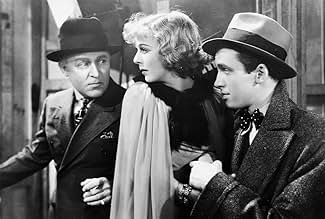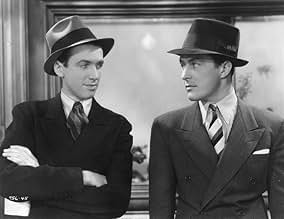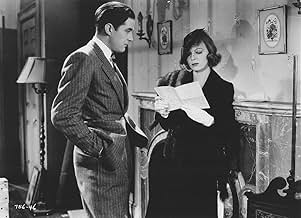AVALIAÇÃO DA IMDb
6,4/10
721
SUA AVALIAÇÃO
Adicionar um enredo no seu idiomaA young married couple's relationship becomes strained when he is assigned overseas as a foreign correspondent and she becomes a major stage star.A young married couple's relationship becomes strained when he is assigned overseas as a foreign correspondent and she becomes a major stage star.A young married couple's relationship becomes strained when he is assigned overseas as a foreign correspondent and she becomes a major stage star.
- Direção
- Roteiristas
- Artistas
- Prêmios
- 3 vitórias no total
Ray Milland
- Tommy Abbott
- (as Raymond Milland)
Ronnie Cosby
- Kit
- (as Ronald Cosbey)
Arthur Aylesworth
- Secretary
- (não creditado)
King Baggot
- Character man
- (não creditado)
Tommy Bond
- Pesky Kid
- (não creditado)
Harry C. Bradley
- Desk Clerk
- (não creditado)
Tyler Brooke
- Author
- (não creditado)
Daisy Bufford
- Maid
- (não creditado)
Jack Cheatham
- Taxi Driver
- (não creditado)
Jack Daley
- Conductor
- (não creditado)
John Dilson
- Stage Manager
- (não creditado)
Charles Fallon
- Prof. Dindet
- (não creditado)
Avaliações em destaque
Friendships help when it comes time for actors and actresses to advance their careers. James Stewart had friends at just the right places in his first year working in film. His friendship with actress Margaret Sullivan proved a crucial step to his becoming one of Hollywood's most popular actors when she heavily lobbied her studio for him as a replacement in January 1936's "Next Time We Love." It was the first of four films the two appeared in together.
Stewart had met Sullivan in his first stage acting gig with the University Players in Cape Cod in the summer of 1932. He worked alongside Sullivan and her husband Henry Fonda with the same Massachusetts company. Sullivan's marriage with Fonda didn't last long, but Stewart's friendship with both endured well after the Cape's theatre summer season ended. Stewart moved to New York City with the now-single Fonda as a roommate to find steady employment on Broadway. Meanwhile Sullivan, relocating to Hollywood, always kept in contact with the two after she signed a short contract with Universal Pictures in 1933. Stewart, after spotted by an MGM talent scout, followed her footpath to Tinseltown, and played in a couple of small roles with the studio, including 1936's "Rose Marie." After seeing her co-star bow out of "Next Time We Love," Sullivan twisted Universal's arm to get MGM to loan-out Stewart as his replacement. The studio agreed, and made arrangements to get Stewart his biggest role on the screen yet.
Filming the early scenes for "Next Time We Love" did not go well for Stewart in the eyes of its director Edward Griffith. He started hectoring the young actor, making him nervous and causing him to stumble over his lines. Sullivan, seeing her friend's career flushing down the toilet right before her eyes, spent the following nights coaching Stewart, instructing him to tamper down his unsteady mannerisms and his clipped delivery Of speaking. After a few days, the director could see a huge difference. "It was Margaret Sullivan who made James Stewart a star," Griffith later said. When the actor returned to his contracted studio, MGM talent scout Bill Grady, who had picked out Stewart on the Broadway stage, noticed a new person. "That boy came back from Universal so changed I hardly recognized him."
"Next Time We Love," adapted from Ursula Parrott's 1935 British novel 'Next Time We Live,' involves Stewart as Christopher Tyler, a reporter who is offered a lucrative overseas position he can't refuse. Meanwhile, his wife Cicely (Sullivan)stays home while pursuing a stage career assisted by Stewart's best friend, Tommy Abbott (Raymond Milland), an insider to Broadway's biggest honchos.
It's a newly refreshed Stewart that makes "Next Time We Live" so noteworthy. Film reviewer David Krauss was startled by the transformation of the new star. "Confident, relaxed, and seemingly so attuned to the finer points of film acting, he comes across as the consummate professional and files a deeply sensitive, unaffected performance that previews the gallery of diverse yet natural characterizations he would etch on celluloid over the next half century." Krauss was equally effusive about Sullivan. "Whether warm, loving, noble, headstrong, resentful, recalcitrant, or devastated, Sullavan is always genuine, and the chemistry she creates with Stewart is both comfortable and crackling. It's not surprising the two made four movies together. I only wish they made more."
Stewart had met Sullivan in his first stage acting gig with the University Players in Cape Cod in the summer of 1932. He worked alongside Sullivan and her husband Henry Fonda with the same Massachusetts company. Sullivan's marriage with Fonda didn't last long, but Stewart's friendship with both endured well after the Cape's theatre summer season ended. Stewart moved to New York City with the now-single Fonda as a roommate to find steady employment on Broadway. Meanwhile Sullivan, relocating to Hollywood, always kept in contact with the two after she signed a short contract with Universal Pictures in 1933. Stewart, after spotted by an MGM talent scout, followed her footpath to Tinseltown, and played in a couple of small roles with the studio, including 1936's "Rose Marie." After seeing her co-star bow out of "Next Time We Love," Sullivan twisted Universal's arm to get MGM to loan-out Stewart as his replacement. The studio agreed, and made arrangements to get Stewart his biggest role on the screen yet.
Filming the early scenes for "Next Time We Love" did not go well for Stewart in the eyes of its director Edward Griffith. He started hectoring the young actor, making him nervous and causing him to stumble over his lines. Sullivan, seeing her friend's career flushing down the toilet right before her eyes, spent the following nights coaching Stewart, instructing him to tamper down his unsteady mannerisms and his clipped delivery Of speaking. After a few days, the director could see a huge difference. "It was Margaret Sullivan who made James Stewart a star," Griffith later said. When the actor returned to his contracted studio, MGM talent scout Bill Grady, who had picked out Stewart on the Broadway stage, noticed a new person. "That boy came back from Universal so changed I hardly recognized him."
"Next Time We Love," adapted from Ursula Parrott's 1935 British novel 'Next Time We Live,' involves Stewart as Christopher Tyler, a reporter who is offered a lucrative overseas position he can't refuse. Meanwhile, his wife Cicely (Sullivan)stays home while pursuing a stage career assisted by Stewart's best friend, Tommy Abbott (Raymond Milland), an insider to Broadway's biggest honchos.
It's a newly refreshed Stewart that makes "Next Time We Live" so noteworthy. Film reviewer David Krauss was startled by the transformation of the new star. "Confident, relaxed, and seemingly so attuned to the finer points of film acting, he comes across as the consummate professional and files a deeply sensitive, unaffected performance that previews the gallery of diverse yet natural characterizations he would etch on celluloid over the next half century." Krauss was equally effusive about Sullivan. "Whether warm, loving, noble, headstrong, resentful, recalcitrant, or devastated, Sullavan is always genuine, and the chemistry she creates with Stewart is both comfortable and crackling. It's not surprising the two made four movies together. I only wish they made more."
Stewart's first breakout role. The magnetism between Sullavan and Stewart is undeniable in this sophisticated story about a couple whose careers don't quite mesh. Their divergent careers inevitably causes their marriage to be a rocky one with many ups and downs. The plot, although a progressive one ahead of its time, is not an appealing one. I wanted to like this movie, but the plot kept me from it. It fell flat and seemed rushed.
Jimmy Stewart's first big role. This is not a romance we are used to with a happily ever after ending. Not even close. Maybe that would make it interesting and worthwhile but meh, I'm not all that impressed with this. You can see the immense talent in the young 27 year old Jimmy but he is still very much coming into his own here. Not the best vehicle for him considering I would never guess his character to be a man under at least 30. Quite a mature role for such a youngster to Hollywood. Still an okay, quick film that isn't his best but is from such a great era that it's hard to say it's bad!
5.7 / 10 stars
--Zoooma, a Kat Pirate Screener
5.7 / 10 stars
--Zoooma, a Kat Pirate Screener
This is a very early Stewart film that really gave him his first big break with a leading role. Sixth billed in "Murder Man" and fifth billed in "Rose Marie", he was barely visible in his first two features at MGM. On loan to Universal, here he was teamed with Margaret Sullivan, and together they play a couple that marries on impulse and then begin pursuing their own individual careers - she is an actress, he is a journalist. Conflict develops when her career takes off and his does not. This film is very typical of those melodramas that were so common in the 1930's, but it is still interesting to see what Stewart does with this early role in his career. Stewart and Sullivan have a better chance to show off their chemistry in 1938's "Shopworn Angel", still it is a good look at a film made right before the Laemmle's lost Universal to creditors. I'd recommend it mainly for the performances.
Among all of Jimmy Stewart's films, "Next Time We Love" is among the more obscure...even though there is some really terrific acting in it as well as three top actors (Margaret Sullavan, Jimmy Stewart and Ray Milland). As far as why it's not a popular film, I have a strong guess....it's not a particularly enjoyable picture and you have a hard time really caring about the characters.
The story itself is a great illustration of the old saying, "Act in haste, repent at leisure". This is because Cicely and Chris (Sullavan and Stewart) meet and decide to get married only a few days later. It's clearly an impulsive move and even before the honeymoon it's clear this will NOT be an easy marriage. Chris is a newspaper correspondent and likes the idea of traveling the world to report the news. This is clearly NOT a career conducive to a great marriage. But to make it worse, Cicely soon takes up acting and she likes it...and it pays well. In fact, when Chris loses a job, she carries them. This SHOULD make them happy but it doesn't. After all, it's the 1930s and a man, a 'real man', was expected to be the bread-winner and a wife was to stay home, make babies and wait for her man to come home from work--which was impossible with being a correspondent and her being an actress. So, years pass and Chris roams the world while Cicely becomes famous...and they barely have any time for each other. Both have created their own separate lives...and all the while, their good friend Tommy (Milland) is there to help Cicely...and soon it becomes apparent Tommy wants to be more than just a friend.
So basically you have two strong-willed people who are more concerned with their careers than each other...something hardly the stuff of a romance or fun film. In many ways, I wonder how much this story was influenced by the Hollywood life...and broken marriages. Either way, the acting is stupendous (particularly by Sullavan)...but the film is still unpleasant and not particularly involving for me. As for me, I just wanted to slap them both and tell them to grow up! After all, they had a child and yet they seemed a bit childish themselves.
The story itself is a great illustration of the old saying, "Act in haste, repent at leisure". This is because Cicely and Chris (Sullavan and Stewart) meet and decide to get married only a few days later. It's clearly an impulsive move and even before the honeymoon it's clear this will NOT be an easy marriage. Chris is a newspaper correspondent and likes the idea of traveling the world to report the news. This is clearly NOT a career conducive to a great marriage. But to make it worse, Cicely soon takes up acting and she likes it...and it pays well. In fact, when Chris loses a job, she carries them. This SHOULD make them happy but it doesn't. After all, it's the 1930s and a man, a 'real man', was expected to be the bread-winner and a wife was to stay home, make babies and wait for her man to come home from work--which was impossible with being a correspondent and her being an actress. So, years pass and Chris roams the world while Cicely becomes famous...and they barely have any time for each other. Both have created their own separate lives...and all the while, their good friend Tommy (Milland) is there to help Cicely...and soon it becomes apparent Tommy wants to be more than just a friend.
So basically you have two strong-willed people who are more concerned with their careers than each other...something hardly the stuff of a romance or fun film. In many ways, I wonder how much this story was influenced by the Hollywood life...and broken marriages. Either way, the acting is stupendous (particularly by Sullavan)...but the film is still unpleasant and not particularly involving for me. As for me, I just wanted to slap them both and tell them to grow up! After all, they had a child and yet they seemed a bit childish themselves.
Você sabia?
- Curiosidades"Lux Radio Theater" broadcast a 60 minute radio adaptation of the movie on November 7, 1938 with Margaret Sullavan reprising her film role.
- Citações
Frank Carteret: It's amazing! The things people ask of love. They expect it to protect them, keep them from being bored, make them work harder. In fact , they want everything except love.
- Versões alternativasCurrent prints of this film feature the Universal logo created in late 1936, and say "The New Universal Presents". That is because they were made after studio founder Carl Laemmle was ousted from Universal Studios and the takeover of the studio by a new conglomerate. The picture was actually released before Laemmle left. That is why the "The End" credit features an airplane circling the globe, the logo that Universal used while Laemmle was in power.
- ConexõesFeatured in Great Performances: James Stewart: A Wonderful Life (1987)
Principais escolhas
Faça login para avaliar e ver a lista de recomendações personalizadas
- How long is Next Time We Love?Fornecido pela Alexa
Detalhes
- Data de lançamento
- País de origem
- Idioma
- Também conhecido como
- Next Time We Love
- Locações de filme
- Empresa de produção
- Consulte mais créditos da empresa na IMDbPro
- Tempo de duração
- 1 h 27 min(87 min)
- Cor
- Proporção
- 1.37 : 1
Contribua para esta página
Sugerir uma alteração ou adicionar conteúdo ausente




































